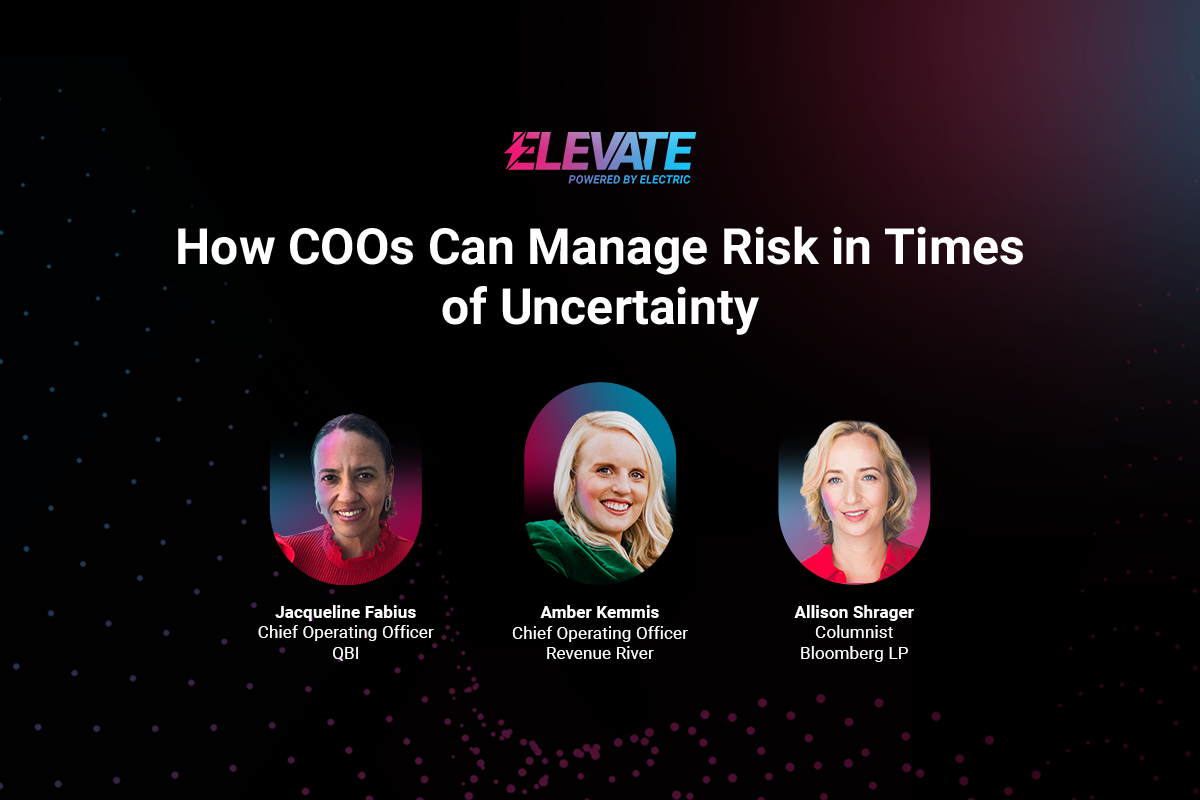
Post-pandemic, many of the risk management strategies that guided our decisions in the past are no longer applicable. Combined with a looming recession, rocketing inflation, and a competitive labor market, uncertainty is at an all-time high.
To examine how COOs can overcome these challenges, Allison Schrager, Senior Fellow at the Manhattan Institute, was joined by Jacqueline Fabius, COO of QBI, and Amber Kemmis, COO of Revenue River, for a panel discussion at Elevate.
Catch up on their conversation in the video below, or read on for the session highlights.
How is economic uncertainty impacting your approach to risk management?
As a services company, Amber says their biggest challenge right now is competition for talent, particularly in the context of trends like the Great Resignation and quiet quitting.
“With economics, we can’t predict risk using the same data we used to. The same thing is happening with people. People are not doing what they used to do. One thing we’re highly focused on is how we predict what people are going to want in the workforce of the future.”
Allison highlighted that one approach to risk management is diversification, which is now more feasible from a hiring perspective thanks to a distributed labor market. “Being able to hire talent abroad feels like one of our secret weapons,” Amber agreed. “We can find some really great talent from all over the world.”
Coming from an academic environment, Jacqueline faces different challenges. The pandemic brought most research work to a standstill, and many scientists are now dealing with a two-year backlog in their advancement.
“We’re also seeing a tremendous amount of confusion about working from home,” says Jacqueline. “Science is a highly collaborative medium, people typically need to get together to exchange ideas, to create, and to move forward. Now, we’re in a strange sort of purgatory where people don’t know whether to show up or not [for meetings and seminars].”
“It’s a struggle figuring out how to pull people back in… We recently had a symposium which showed the hunger of people wanting to come back. We expected 250 people and 400 came, so there’s obviously a desire to be back in person. But in order to do this, we also had live events and all kinds of things to attract people to this scientific meeting. In many ways, we have to up our game in what we’re offering people to gather, even though once they come together, they’re very happy to be there.”
How are you approaching compensation in the context of inflation?
Jacqueline highlighted that, in her field, salaries are often dictated by the National Institute of Health. As an organization based in an expensive city like San Francisco during a cost of living crisis, this is creating significant barriers.
Amber added that people are usually less likely to seek pay rises during times of economic uncertainty, but this isn’t currently the case. “Normally, when the economy does what it’s doing right now, people hold on to jobs a little tighter. They’re not necessarily taking risks for that pay bump. But, research shows people are still confident leaving jobs, they are leaving for better pay. At the same time, companies are offering better salaries because of inflation.”
Is quiet quitting real?
Allison raised the concept of quiet quitting as another emerging risk in the workplace. “There is a portion of people who are getting smarter about not letting work drive their world,” says Amber. “People are now saying, ‘my job doesn’t have to be my life’. But I think there’s an element of disengagement that’s happening, too, because people are just feeling different post-pandemic.”
Jacqueline says she looks at it as passive stagnancy. “I think there are a lot of people who are sitting in their jobs and being stagnant while pretending to be mentally there… They’re physically there, or remotely there on Zoom, but they’re not really contributing.”
Amber says part of the problem is that companies haven’t figured out how to measure productivity in a remote environment. Allison questioned whether this also creates a lack of accountability.
“I think it’s a question of integrity,” says Jacqueline. “You either have a good worker, or you don’t. When you have a good worker, if they’re remote, they’re still producing. And vice versa, if they’re not a fantastic worker, even when they’re present, they’re not producing. I don’t think remote work creates lazy people, but I don’t think we’ve quite reached a happy medium of how that works yet.”
Amber’s experience has differed in that she has seen some employees perform better in certain environments. “I think companies have a lot of great employees who did well in an office environment but aren’t achieving the same level of productivity in a home environment. When I forecast, that has a huge impact, because they’re great employees but are they going to be able to produce in a hybrid or remote environment? What the data is telling me is that they’re not doing as well right now, in some cases.”
Have the skills you’re looking for changed since 2019?
“When we started the Institute in 2016, we were looking for passionate people who could come in and wear many hats,” says Jacqueline. Post-pandemic, we’re looking for people who can be extremely efficient in what they do and move things forward.”
“However, just because we need someone who is focused on working and success, doesn’t mean they shouldn’t be passionate, but it’s different in how we’re looking at people. We’re also more careful. Now, to manage the risk of finding the right fit, we’re providing shorter contracts to people to assess their skills and abilities.”
Allison questioned whether the panelists would revert to past hiring practices if the labor market becomes less competitive.
“I don’t think that it’s going to go back to the way it was before,” says Amber. “Right now, we’re seeing a diverse set of industries where some are growing, some are fine, and others are slowing down. For us, we’re pretty diversified in who we serve. It might slow down in one place and speed up somewhere else, and the type of talent we might need will ebb and flow in the same way.”
Learn More From Elevate 2022
Want to hear more from our speakers at Elevate 2022? The event recordings are now available to watch here, with coverage and recaps also available on the Electric blog!



